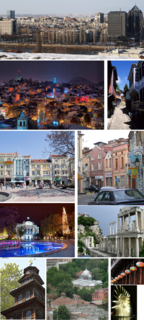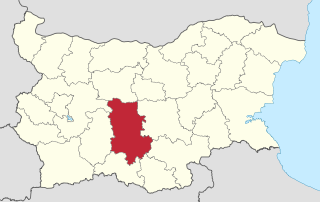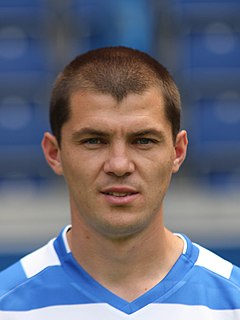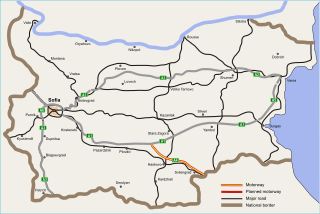Related Research Articles

Bulgaria, officially the Republic of Bulgaria, is a country in Southeast Europe. It is situated on the eastern flank of the Balkans, and is bordered by Romania to the north, Serbia and North Macedonia to the west, Greece and Turkey to the south, and the Black Sea to the east. Bulgaria covers a territory of 110,994 square kilometres (42,855 sq mi), and is the sixteenth-largest country in Europe. Sofia is the nation's capital and largest city; other major cities are Plovdiv, Varna and Burgas.

Plovdiv, is the second-largest city in Bulgaria, standing on the banks of the Maritsa river in the historical region of Thrace. It has a population of 346,893 as of 2018 and 675,000 in the greater metropolitan area. Plovdiv is the cultural capital of Bulgaria and was the European Capital of Culture in 2019. It is an important economic, transport, cultural, and educational center.

Eastern Rumelia was an autonomous province in the Ottoman Empire, created in 1878 by the Treaty of Berlin and de facto ended in 1885, when it was united with the Principality of Bulgaria, also under Ottoman suzerainty. It continued to be an Ottoman province de jure until 1908, when Bulgaria declared independence. Ethnic Bulgarians formed a majority of the population in Eastern Rumelia, but there were significant Turkish and Greek minorities. Its capital was Plovdiv. The official languages of Eastern Rumelia were: Bulgarian, Greek and Ottoman Turkish.

Plovdiv Province is a province in central southern Bulgaria. It comprises 18 municipalities on a territory of 5,972.9 km2 (2,306.1 sq mi) with a population, as of February 2011, of 683,027 inhabitants. The province is named after its administrative and industrial centre — the city of Plovdiv.

Pazardzhik is a city situated along the banks of the Maritsa river, southern Bulgaria. It is the capital of Pazardzhik Province and centre for the homonymous Pazardzhik Municipality.
Alexenia Dimitrova is a Bulgarian journalist and author who started her career in the late 1980s. She works for 24 chasa, the second largest Bulgarian daily. Her favorite topics are secret archives of the Cold War era, shadow affairs and corruption, money laundering, suspicious ownership and property, and secret societies. She profiled finding and reuniting lost people all over the world. For her series of publications about missing persons that started in July 2002, she received Chernorizets Hrabar in November 2004. She was nominated for the same award in 2003.

Valeri Angelov Domovchiyski is a Bulgarian professional footballer who plays as a striker for Maritsa Plovdiv.

International Fair Plovdiv, held in Plovdiv, is Bulgaria's largest and oldest international trade fair. It was established in August 1892 as an industrial and agricultural show.

Romani people in Bulgaria constitute Europe's densest Romani minority. The Romani people in Bulgaria may speak Bulgarian, Turkish or Romani, depending on the region.

Starosel is a village in central Bulgaria, Hisarya Municipality, Plovdiv Province. It lies at the foot of the Sredna Gora mountain range along the shores of Pyasachnik River.

The Maritsa motorway, designated A4, is a motorway in Bulgaria, part of the Pan-European Corridor IV, between the Trakia motorway (A1), at the town of Chirpan, and Kapitan Andreevo, at the Turkish border.

Sadovo is a small town in Sadovo Municipality, Plovdiv Province, central Bulgaria, and the administrative center of Plovdiv. The population as of 2011 is 2,600.

Stolipinovo is a district of the Bulgarian city of Plovdiv and the most populous predominantly Romani-inhabited district on the Balkans with a population of about 40,000 people. It is a ghetto located on the outskirts of the city, in its northeastern part on the right bank of the Maritsa.
Hadji Hassan Mahala is the third biggest Roma ghetto in Plovdiv, Bulgaria. With a population of 8,000, residents generally regard themselves as being of the Turkish ethnicity. They do not identify themselves as part of the communities living in Stolipinovo and Sheker Mahala.
Harman Mahala is the fourth biggest Roma ghetto in Plovdiv, Bulgaria. It is located in the northern part of the city near the road to Karlovo.

The Anevo Fortress or Kopsis (Копсис) is a medieval castle in central Bulgaria, the ruins of which are located some 3 kilometres (1.9 mi) from the village of Anevo in Sopot Municipality, Plovdiv Province. Constructed in the first half of the 12th century, it lies on a steep hilltop at the southern foot of the Balkan Mountains, not far from the Stryama river. In the end of the 13th century, the fortress was the capital of a small short-lived quasi-independent domain ruled by the brothers of Tsar Smilets of Bulgaria, Voysil and Radoslav.

Boyko Metodiev Borisov is a Bulgarian politician who served as the prime minister of Bulgaria from 2009 to 2013, 2014 to 2017, and 2017 to 2021, making him Bulgaria's second-longest serving prime minister to date.

Dzhumaya Mosque is located in Plovdiv, Plovdiv Province, Bulgaria. Its Turkish name is Hüdavendigâr Camii or Cuma Camii. The mosque is located in the centre of Plovdiv and was built in 1363–1364 on the site of the Sveta Petka Tarnovska Cathedral Church after the conquest of Plovdiv by the Ottoman army. During the reign of Sultan Murad I in the 15th century the old building was demolished and replaced by the modern-day mosque. It was called Ulu Dzhumaya Mosque, or Main Friday Mosque.
Alyosha is an 11-metre (36-foot) tall reinforced concrete statue of a Soviet soldier on Bunarjik Hill in Plovdiv, Bulgaria. The statue tops a 6-metre (20-foot) pedestal lined with granite. The memorial commemorates Soviet casualties incurred during the Soviet occupation of Bulgaria in World War II. It was installed in 1954-57.

Valeri Simeonov Simeonov is a Bulgarian politician who is one of the leaders and founding members of the National Front for the Salvation of Bulgaria.
References
- ↑ "Tensions in Bulgaria's Plovdiv Subside, Provoked by Roma Boss - Report - Novinite.com - Sofia News Agency". www.novinite.com. Retrieved 2022-06-17.
- ↑ "Валери Симеонов се закани да вземе мерки срещу пловдивската "Шекер махала"". Bgonair (in Bulgarian). Retrieved 2022-06-17.
- ↑ "Вицепремиерът Валери Симеонов провери изпълнението на мерките в "Шекер махала"". bnr.bg (in Bulgarian). Retrieved 2022-06-17.